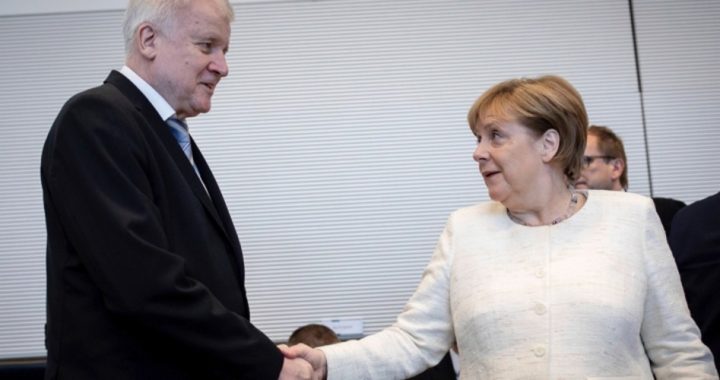
Just when it appeared that the governing coalition of German Chancellor Angela Merkel of the Christian Democratic Union (CDU) was going to break up over immigration issues, a compromise was reached late Monday. Merkel and Interior and Homeland Minister Horst Seehofer (shown, left) of the more conservative Christian Social Union (CSU) were locked in talks for two days, and finally averted the end of a seven-decades long coalition between the two parties.
The CSU is strongest in more rural Bavaria, a stronghold of Catholic conservatism.
Seehofer’s offer of resignation would have brought down the government, as Merkel would have been two seats short of a majority needed to form a governing coalition.
But it did not happen, as Merkel called the agreement a “really good compromise.” She added, “This preserves the spirit of partnership in the European Union (EU) while at the same time taking a decisive step towards organizing and managing secondary immigration.”
“Secondary immigration” refers to immigrants who enter some member nation of the EU then migrate to another member nation of the EU. Once one member nation has accepted an immigrant, other member nations are generally obligated to accept them.
Seehofer explained how the compromise would work, saying that the German government would establish what are called “closed centers” near its border (mostly with Austria) where asylum-seeker applications would be reviewed in a streamlined process. While details are still sketchy regarding the compromise deal, Seehofer said it was enough for him to remain in the cabinet — and for the CDU-CSU coalition to survive.
“We have a clear agreement on how to prevent illegal migration in future on the border between Germany and Austria,” Seehofer said. “I am glad that this agreement has been reached. It has once again proved to be worth fighting for a conviction. And what has now been agreed is really a clear agreement that is very sustainable for the future.”
While the CDU and the CSU have managed to work out their differences, for now, it is not known whether Merkel’s center-left partners, which include the Social Democrats, agree with the deal. Andrea Nahles of the Social Democrats condemned Seehofer’s moves to force tougher immigration policies as “blackmail attempts.” Der Spiegel even asked if the CSU had “lost its mind.”
On Sunday, Seehofer publicly threatened that he was willing to resign over what he called unbridgeable political differences. He is reported to have muttered that he “can’t work with this woman anymore,” referring to Chancellor Merkel. Some EU advocates have even taken to ridiculing Seehofer after he successfully won a name-change for his ministry, adding the word Homeland (Heimat in German) to Interior. They saw the name change as intending to emphasize German nationalism and backward-looking, and even evoking quaint images from the 1950s.
Globalists despise such attitudes and are leading the charge for the erasure of meaningful borders around the world, including in Europe, in part through increased immigration. For example, according to the May/June 2018 issue of Foreign Affairs, the publication of the Council on Foreign Relations (CFR), a powerful globalist organization based in New York City, “The immediate cause of rising support for authoritarian, xenophobic populist movements [in Europe] is a reaction against immigration.”
This attitude — that those who do not support mass immigration are “xenophobic” — is shared by fellow globalists in Europe. A smaller political party, the anti-Islamic Alternative for Germany (AFD), which opposes mass immigration, is derided as a “far-right party,” but it has gained strength in recent elections owing to rising concerns about immigration and Islamic terrorism. In September of last year, both the CDU and the CSU lost millions of voters to the AFD.
Perhaps in response, Seehofer caused a national stir when he declared, “Islam is not part of Germany.” His Bavarian party rival, Markus Soeder, even ordered Christian crosses fixed in all state buildings, saying the crosses were “a fundamental symbol of our Bavarian identity and way of life.”
On the other hand, Merkel refused in 2005 to express an explicitly Christian view, arguing more vaguely that the CDU has never lost its “concept of values.” Then, in 2015, Merkel declared that Germany’s borders would remain open to the wave of migrants pouring into Germany via the Balkans. She even supported cash benefits for asylum seekers. Not surprisingly, over one million “asylum seekers” have flooded into Germany. This led to the first public differences between Merkel and Seehofer. Seehofer took the opportunity at a CSU Congress soon afterward to publicly criticize Merkel’s refusal to stem the tide of immigration — mostly from the Islamic Middle East.
So the shaky Merkel coalition survives — for now. But the issue of immigration is not going away. Germans, like Americans, intuitively understand that the purpose of mass immigration is to destroy the concept of nationhood, and, more specificaly, to submerge the West into a “multicultural” globalist society. It is all part of the goal to replace the nation-state and national governments with multinational organizations such as the UN. Americans who enjoy their freedom and appreciate Western culture should take note of what is happening in Europe.




